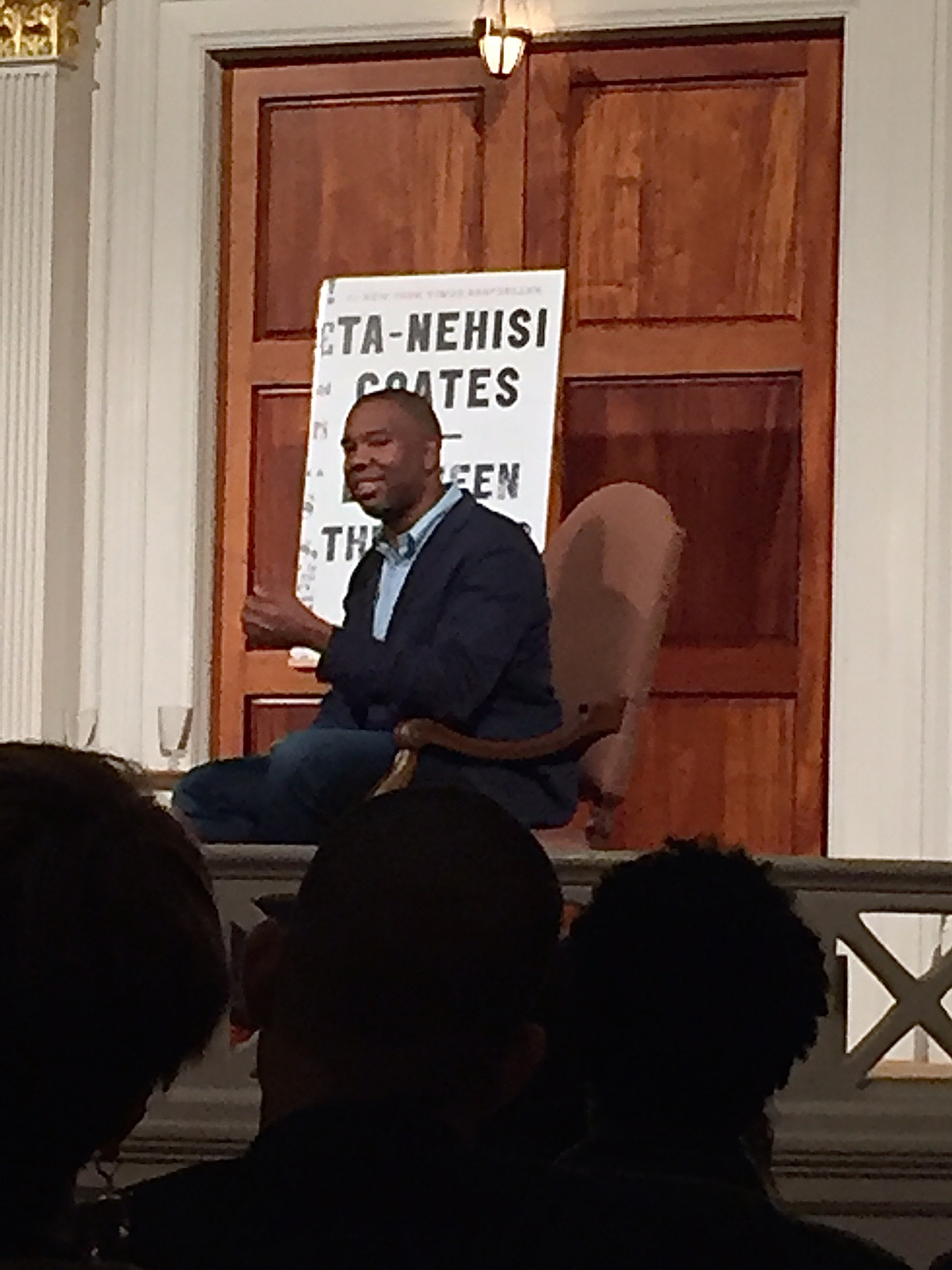Evenings with Ta-Nehisi Coates and Ruth Reichl
/I love living in a city that teems with cultural opportunities. This past week felt especially rich, and although I cannot wait, literally, to go to bed tonight, the fatigue is worth it.
On Wednesday, not two hours after traffic mayhem, swimming lessons, gobbling pizza, hopping the Metro and arriving in Chinatown, I made it to the historic Sixth & I synagogue where an energetic line stood waiting for the doors to open,
I took my seat, the closest to the dais I've ever had at Sixth & I, and took in the effervescent buzz of anticipation around me. Ta-Nehisi Coates was soon to take the stage.
Have you read any of Coates' work? He writes for The Atlantic (The Case For Reparations was an incredibly journalistic accomplishment; The Black Family in the Age of Mass Incarceration is in the Oct 2015 issue), has been published in the New York Times and has written two books. Between the World and Me is on the short list for the 2015 National Book Award, and Coates was just awarded a MacArthur Fellows grant.
Wednesday's talk was part of his book tour for Between the World and Me, his recently published letter to his son about the history and present of being black in America. Of blacks never having had full access to what Coates calls The Dream.
It is perfect houses with nice lawns. It is Memorial Day cookouts, block associations, and driveways. The Dream is treehouses and the Cub Scouts. The Dream smells like peppermint but tastes like strawberry shortcake. And for so long I have wanted to escape into the Dream, to fold my country over my head like a blanket. But this has never been an option because the Dream rests on our backs, the bedding made from our bodies.
The letter is, as he said in an interview, a literary construct, but Coates told us that he tried to be as unsparing in this book as he is when speaking with his son. Which is to say, brutally candid about his perspectives and confusion and fears, for blacks, America and his boy.
He feels that in doing so, real trust is built, and I agree. He has a presence and authority that comes from mincing no words and buttressing his arguments with research and facts.
Coates grew up in Baltimore. Looking back, after college at Howard University -which he credits as the watershed experience of his life- he believes it wasn't rage or violence that really explains all he saw and witnessed on his childhood streets. It was fear.
Not being violent enough could cost me my body. Being too violent could cost me my body. We could not get out. I was a capable boy, intelligent, well-liked, but powerfully afraid. And I felt, vaguely, wordlessly, that for a child to be marked off for such a life, to be forced to live in fear was a great injustice.
Coates' writing is so powerful. In print he often seems a hyper-intellectual firebrand. I love reading his work and admire him tremendously, but I wasn't sure what his in-real-life presence would be like. Would he seem prickly?
Not in the least. He is totally charming, affable, funny, warm, at ease and so very bright. I laughed, was brought to tears, and found myself repeatedly nodding my head in agreement or disbelief. It was an important night for me, and I enjoyed myself tremendously.
*******
Last night, T and I joined friends at Buck's Fishing and Camping (same place the Gabrielle Hamilton dinner was held; remember? I asked a three-part question!) for a dinner celebrating the release of Ruth Reichl's new cookbook/memoir, My Kitchen Year.
Long, long ago, I read two of Reichl's memoirs, Tender at the Bone and Comfort Me With Apples. I can hardly remember the details, but I remember feeling enveloped by her stories, her writing, the way she wrote about childhood, adulthood, food.
I thought she was a marvelous editor at Gourmet and loved her emphasis on publishing long-form food writing. Real, substantive, literary work. When Conde Nast suddenly and unceremoniously shuttered the magazine's doors in 2009, I was both surprised and deeply disappointed. At that time, Reichl was 62, and couldn't recall the last time she hadn't had a job. What was her identity without one?
She did what she'd always done when stressed or sad. She went to her kitchen and cooked. My Kitchen Year is the result. It's a simply presented book, 136 recipes dancing with stretches of Reichl's effortless prose. You feel you can make these recipes and do so successfully, and I believe that's Reichl's aim.
She wants people back in the kitchen because she knows what transpires when one cooks to nourish oneself and others. It's something along the lines of healing. At least it was for her.
Of course I asked a question, which was along the lines of the place and future of food memoir in a time that often prefers soundbites, and later got to sit by Ruth for a while. She was gracious and lovely and signed not only my copy of My Kitchen Year but also the old paperback copies of Tender at the Bone and Comfort Me With Apples I'd pulled from my 'favorites' shelf as I ran out the door.












